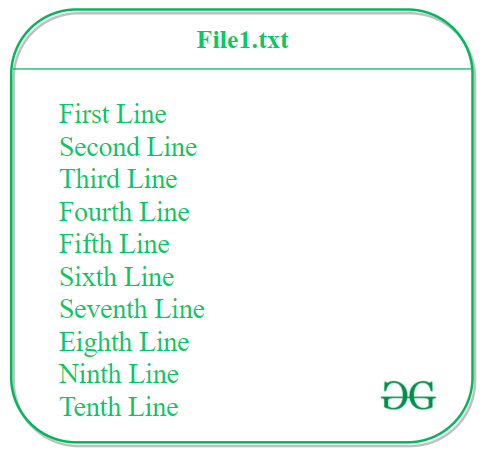Python – 读取文件的最后 N 行
先决条件:在Python中逐行读取文件
给定一个文本文件fname ,一个数字N ,任务是读取文件的最后 N 行。
众所周知, Python提供了多种用于处理文件的内置功能和模块。让我们讨论使用Python读取文件最后 N 行的不同方法。
文件:

方法一:天真的方法
在这种方法中,想法是使用带有 readlines()函数的负迭代器从文件末尾读取用户请求的所有行。
Python3
# Python implementation to
# read last N lines of a file
# Function to read
# last N lines of the file
def LastNlines(fname, N):
# opening file using with() method
# so that file get closed
# after completing work
with open(fname) as file:
# loop to read iterate
# last n lines and print it
for line in (file.readlines() [-N:]):
print(line, end ='')
# Driver Code:
if __name__ == '__main__':
fname = 'File1.txt'
N = 3
try:
LastNlines(fname, N)
except:
print('File not found'Python3
# Python implementation to
# read last N lines of a file
# Using OS module and buffering policy
# importing os module
import os
# Function to read
# last N lines of the file
def LastNlines(fname, N):
# taking buffer size of 8192 bytes
bufsize = 8192
# calculating size of
# file in bytes
fsize = os.stat(fname).st_size
iter = 0
# opening file using with() method
# so that file get closed
# after completing work
with open(fname) as f:
if bufsize > fsize:
# adjusting buffer size
# according to size
# of file
bufsize = fsize-1
# list to store
# last N lines
fetched_lines = []
# while loop to
# fetch last N lines
while True:
iter += 1
# moving cursor to
# the last Nth line
# of file
f.seek(fsize-bufsize * iter)
# storing each line
# in list upto
# end of file
fetched_lines.extend(f.readlines())
# halting the program
# when size of list
# is equal or greater to
# the number of lines requested or
# when we reach end of file
if len(fetched_lines) >= N or f.tell() == 0:
print(''.join(fetched_lines[-N:]))
break
# Driver Code:
if __name__ == '__main__':
fname = 'File1.txt'
N = 3
try:
LastNlines(fname, N)
except:
print('File not found')Python3
# Python implementation to
# read last N lines of a file
# through Exponential search
# Function to read
# last N lines of the file
def LastNlines(fname, N):
# assert statement check
# a condition
assert N >= 0
# declaring variable
# to implement
# exponential search
pos = N + 1
# list to store
# last N lines
lines = []
# opening file using with() method
# so that file get closed
# after completing work
with open(fname) as f:
# loop which runs
# until size of list
# becomes equal to N
while len(lines) <= N:
# try block
try:
# moving cursor from
# left side to
# pos line from end
f.seek(-pos, 2)
# exception block
# to handle any run
# time error
except IOError:
f.seek(0)
break
# finally block
# to add lines
# to list after
# each iteration
finally:
lines = list(f)
# increasing value
# of variable
# exponentially
pos *= 2
# returning the
# whole list
# which stores last
# N lines
return lines[-N:]
# Driver Code:
if __name__ == '__main__':
fname = 'File1.txt'
N = 3
try:
lines = LastNlines(fname, N)
for line in lines:
print (line, end ='')
except:
print('File not found')输出:
Eighth line
Ninth line
Tenth line
方法二:使用操作系统模块和缓冲策略
在这种方法中,想法是在Python中处理缓冲策略。缓冲区存储从操作系统的文件流接收到的部分数据,并在使用一段时间后进入更多数据。
缓冲区大小决定了在使用之前一次可以存储的数据的大小。我们可以选择将整数传递给缓冲以设置缓冲策略,如果我们不指定任何策略,则缓冲区的大小取决于设备的块大小。通常,缓冲区的长度为 4096 或 8192 字节。在这种方法中,缓冲区的大小为 8192 字节。
此外,OS 模块中 os.stat() 方法的st_size属性用于表示文件的大小(以字节为单位)。
下面是上述方法的实现。
Python3
# Python implementation to
# read last N lines of a file
# Using OS module and buffering policy
# importing os module
import os
# Function to read
# last N lines of the file
def LastNlines(fname, N):
# taking buffer size of 8192 bytes
bufsize = 8192
# calculating size of
# file in bytes
fsize = os.stat(fname).st_size
iter = 0
# opening file using with() method
# so that file get closed
# after completing work
with open(fname) as f:
if bufsize > fsize:
# adjusting buffer size
# according to size
# of file
bufsize = fsize-1
# list to store
# last N lines
fetched_lines = []
# while loop to
# fetch last N lines
while True:
iter += 1
# moving cursor to
# the last Nth line
# of file
f.seek(fsize-bufsize * iter)
# storing each line
# in list upto
# end of file
fetched_lines.extend(f.readlines())
# halting the program
# when size of list
# is equal or greater to
# the number of lines requested or
# when we reach end of file
if len(fetched_lines) >= N or f.tell() == 0:
print(''.join(fetched_lines[-N:]))
break
# Driver Code:
if __name__ == '__main__':
fname = 'File1.txt'
N = 3
try:
LastNlines(fname, N)
except:
print('File not found')
输出:
Eighth line
Ninth line
Tenth line
方法3:通过指数搜索
在这种方法中,想法是使用指数搜索算法,该算法通常用于搜索排序的、无界的或无限的列表。要获取有关指数搜索的信息,请单击此处。
这种方法使用断言语句作为调试工具来检查条件。如果给定的语句为真,程序将继续执行,否则会产生AssertionError 异常。要获取有关断言语句的更多详细信息,请单击此处。
单击此处以熟悉 seek() 方法的不同用途。
下面是上述方法的实现。
Python3
# Python implementation to
# read last N lines of a file
# through Exponential search
# Function to read
# last N lines of the file
def LastNlines(fname, N):
# assert statement check
# a condition
assert N >= 0
# declaring variable
# to implement
# exponential search
pos = N + 1
# list to store
# last N lines
lines = []
# opening file using with() method
# so that file get closed
# after completing work
with open(fname) as f:
# loop which runs
# until size of list
# becomes equal to N
while len(lines) <= N:
# try block
try:
# moving cursor from
# left side to
# pos line from end
f.seek(-pos, 2)
# exception block
# to handle any run
# time error
except IOError:
f.seek(0)
break
# finally block
# to add lines
# to list after
# each iteration
finally:
lines = list(f)
# increasing value
# of variable
# exponentially
pos *= 2
# returning the
# whole list
# which stores last
# N lines
return lines[-N:]
# Driver Code:
if __name__ == '__main__':
fname = 'File1.txt'
N = 3
try:
lines = LastNlines(fname, N)
for line in lines:
print (line, end ='')
except:
print('File not found')
输出:
Eighth line
Ninth line
Tenth line